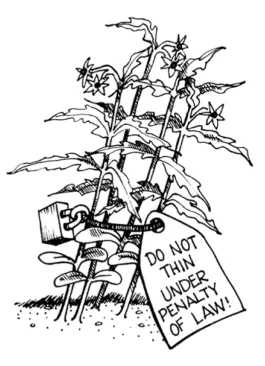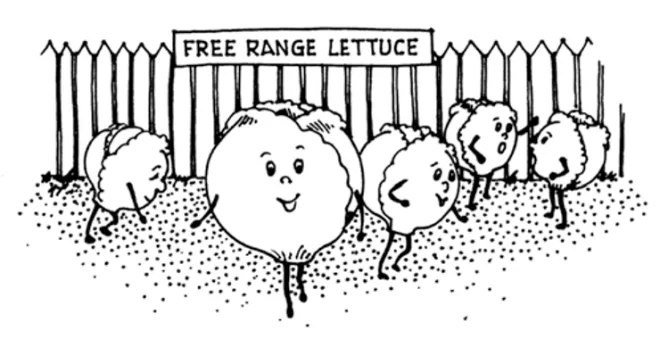
I must needs be pounding out these wascally words in the barely-of-Spring, whence I am (or should that be was? Or even will be, if you consider I’ll probably be equally—if somewhat differently—horticulturally foolish again next season [one thing that sets us gardening types apart from normal people is the wonderful personality trait that allows us to return to our donnybrooks with the dirt year after year. I call it “our sense of boundless optimism,” while others more correctly point out that we are probably just not paying attention]) wondering what this Summer’s garden will look like.
OK—I’m actually wondering if there will be one (garden OR Summer). This endless Winter (now entering its second week of Spring) has me despairing of ever again experiencing such summertime joys as having a Japanese beetle bounce off your forehead going 40 miles an hour.
What? Oh, OK—but just this once. {In the voice of Groucho, of course:} “…and what my forehead was doing going 40 miles an hour, I’ll never know.” Thank you.
Should that sacred season of heat and humidity ever arrive, I do know that during it the garden will be even more infested with tomatoes than usual. Hideously depressed by an especially brutal stretch (it wasn’t the actual amounts of snow; in fact, I welcomed finally having that “reliable snow cover” all the books tell us we should covet [failing to mention such negative side effects as the lower resale value of your car after several episodes of looking for the edges of its buried self with a broomstick: Ding! Oh, joy—there’s the hood!] for a change—it was the timing. This was a hard-boiled pulp-fiction novel of a Winter, where you finally pull yourself up back over the precipice after hours of the bad guy stomping on the lone hand that kept you from falling into the bottomless chasm, breathe a sigh of relief, stand up, turn around, and notice that Mike Tyson’s right hand is about two inches away, closing fast and looking to change your views on life), I started my tomatoes too early.

In February. OK—early February. OK—so early it still begins with a “J.” Which is usually two months ahead of time (or two USDA growing zones short). And so, as I punish this poor keyboard with my persprecariousness, we are still roughly eight weeks away from a safe setting-out date and I have two-foot-high trees under my shoplights. Thirty-four two-foot-high trees. All ready and pumped to go into a postage stamp of a garden that was crowded with ten plants last year. But you can’t thin tomato plants once they’re more than a foot tall—it’s a state law or something.

I started lettuce back then, too. Hey it’s a “cool-weather crop”—and 20° IS cool! And the snow has finally melted (well, except for the stuff that’s falling down now…), but the ground is as soft and workable as the center of a frozen turkey. So I’ve been farming the lettuce in the recycled six-packs it was started in (and will probably die in, as well). Every morning I take the trays out onto our sunny deck railing (I’d feel bad but this area gets, like, 16 times more sun than the actual garden, but am comforted by the knowledge that as soon as the trees leaf out, it will more closely resemble the lumens level in the Land of Darkness and Raised Beds, which is shaded by evergreens and therefore consistently the horticultural equivalent of a 15-watt light bulb), and then I bring them in again at night, like other people do with cats (hey—Free Range Lettuce! That’s good, right?). It actually works very well (we’ve been harvesting the plants “cut and cut again” style for a month now), despite making no sense whatsoever—which around here, is fairly analogous to all my gardening endeavors.
My perennial peppers (dug out of the garden every Fall to live inside under big shop lights all winter) have been a similar Alice in Wonderland/Bizarro World triumph. The hot peppers just love this season-extension-to-the-max; producing summer-quality fruit all Winter long. But while I’ve generally been able to coax the bell plants through the Winter alive, they’ve never looked all that happy about it. If plants had living wills, some years there would have been court orders for me to turn off the shoplights.
But not this year, when (if physical reality were to suddenly begin applying to the garden sins I commit) the scene should have been sadder than ever. I had two really tall bell plants that didn’t fit under either of my two dining room winter-plant shoplights, so I positioned them kind of, sort of “in between” the two fixtures, where they bask in whatever small amount of dim ambient light manages to survive the long trip down into their abyss. Surprisingly, they not only didn’t die right away, but ripened up all their existing green peppers to tasty red ones! And then they didn’t die after that, either! In fact, all the pepper plants have done really well this Winter, especially the hotties, which have kept me indoor-harvest hopping.
And then my son Max announces during an early March dinner, “Dad, one of your bell peppers is red; you should pick it.” And I replied, “Oh, you mean a hot pepper; and yeah, there’s a ton of ripe ones I’ve gotta get to soon.”
“No, Dad—a BELL pepper; I know the difference!”
And, despite being a boy (“Steeeeerike one!“), ten years old (“Streeeerike TWO!“), AND having inherited a frightening percentage of his father‘s genetic proclivities (the ump raises his right hand, pulls off his mask and starts to form the words, “You’re…”—but then stops suddenly), Max was not only safe at the plate that bat, but had correctly observed that one of my sweet bell plants—and, yes, it was indeed one of the pair being drenched in Stygian darkness—had hit a home run. The pepper wasn’t huge, but it was perfect and 90% red. (And, astonishingly, it had 100% flowered, fruited, growed, and ripened indoors in the kind of light your parents used to warn you that you’d ruin your eyes trying to read in.)
I picked it, sliced it, bit into a piece, and BOOM!—it was Summer! Real Summer! Sun on the back of your neck, crack of the bat, going to the soft ice cream stand after dinner, lawnmower sounds in the distance, not dark yet at 9 o’clock at night Summer!
I was strolling on a boardwalk, swimming in the ocean, cheering at a ball game (OK—I was booing; I am sorry—but I grew up in Philadelphia, where my grandfather taught me to encourage our National League Boys of Summer [worst lifetime record of ANY professional sports team—in any sport! Whoo! We’re Number One! We’re Number One!] by screaming, “You bums should pay to get into the park!”), coloring my lips red with a cherry snowball, and getting bit by mosquitoes all at once.

I suddenly realized that it isn’t only winter tomatoes that betray the true season of their growth with a taste that redefines fraudulent; off-season supermarket peppers are just as bad! But not this homegrown baby—it tasted pure late July. And then we saw that there were a dozen small sweet winter peppers total; every bell plant had at least one. Amazing.
The icy winds still howled, the TV weather-guessers continued their campaign of terror, the snow squalls kept coming, and the crocuses kept trying to pull their nice warm mulches back overtop of them. But I was saved. Summer was a certainty now. Instead of being a terrible mistake, my Sequoia tomato forest had become an opportunity. Let’s rig up some homemade cloches and Wall o’ Waters (or is that Walls o’ Water, like Attorneys General?) out of old springwater jugs and water-filled wine bottles with their necks jammed into the ground, and challenge the season! My soldiers are tall! They’re hardy!
(And there’s so many of them that the words “April cannon fodder” come to mind.)
Ruby red by the Fourth of July!!!!
…And if that red turns out to “only” be broadcast by big sweet bell peppers instead of tomatoes, I think I’ll bear up. ❖
This article was published originally in 2018, in GreenPrints Issue #113.



